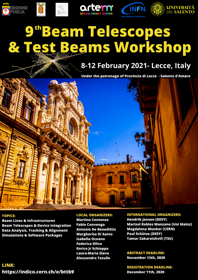Speakers
Description
The upcoming High-Luminosity upgrade of the CERN Large Hadron Collider (HL-LHC) and the R&D on future accelerators (FCC) require radiation hardness tests and qualification of tracking and calorimetry detector components as well as muon gas detectors. The reference facilities at CERN for this kind of irradiation tests are the East Area Proton Irradiation Facility (IRRAD) and the North Area Gamma Irradiation Facility (GIF++).
In the first part of this presentation, the key steps for performing an irradiation experiment (preparation, execution, dosimetry, samples logistic & results availability) will be reviewed in the light of the new IRRAD Data Manager (IDM) web application developed for this purpose. The new infrastructure, control system, hardware, and software components being upgraded and available to the IRRAD users after the Long Shutdown 2 (LS2) will also be presented. Finally, a comprehensive data model for irradiation experiments, pre-requisite for developing common software tools for the irradiation facilities community at large, and a milestone for the forthcoming R&D activities within the EU-funded AIDAinnova project will be also discussed.
In the second part a short summary of the recent improvements at the GIF++ will be presented. The facility was operational with the gamma source throughout the long shutdown 2, when the workload of the facility has even increased due to several mass-production tests. We give an overview of the current test programs, the various upgrades to the facility during the LS2, the available infrastructure and plans to enhance the muon beam intensity and availability before the next SPS proton run. Possible upgrades to the facility during LS3 or beyond will be outlined.
